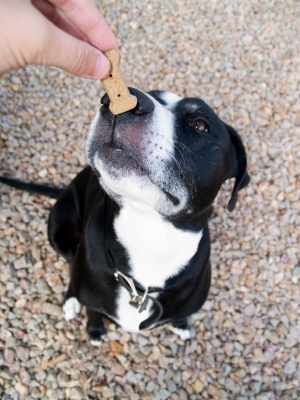Is It A Bribe & A Lure?

Some people still don't get it.
Bribes and lures are not the same thing. Not the same thing! Bribing is not a training method, but a weak management strategy and one I would generally not recommend because it can really become a crutch, and just as likely, the part of the antecedent cue of the training scenario.
An example of bribing: you are ready to leave the park but cannot catch your dog, she's having too much fun and knows that if she comes to you the leash will be snapped on and the fun-park-time will end (how to avoid that is a story for another day). You've been calling her to come for ten minutes to no avail. You then produce a tasty morsel of chicken and seductively coo "CHICKEN, LUCY, CHIIIIIICKEN!" while dangling and waving a greasy morsel from your fingers. Lucy comes close enough to you to grab the chicken-y goodness and you quickly snap the leash on while she's in range. Mission accomplished? Sure, you get to go home now. Training the recall? Absolutely not. Why? Because you had to produce the chicken before the cue and then GAVE YOUR DOG THE CHICKEN. Plus the dog only comes once chicken has been produced even though you’ve had her for three years. You can almost never catch her unless you’ve got some chicken on you.
So what the heck is a lure?
A lure is a training tool that prompts the action you would like to see more of in your subject (the dog for instance) and, as a tool or training implement, must be phased out within the first training session in order to also avoid it becoming a long-term part of the antecedent cue. Ah, haaaa.... this is where it gets confusing.
Isn't that what the chicken did in the park scenario above?
It is easy to tell the difference between a bribe and a REWARD because a bribe is produced before the action while a reward is produced after the requested action has been completed, as a reward, duh.
But what separates a bribe from a LURE? People seem to have much more trouble with this one. Is there a difference? If so, where do they part company?
In short a lure is a tool, and a bribe is a cheap payoff. The difference is in the delivery. Another difference is the amount of time one relies on the tool to prompt the behavior they are trying to reinforce.
A lure is not meant to also be given to the dog as a reward. Also, a lure must be phased out and replaced by the cue within the first training session.
This may be easier to understand if we use something other than food as the reward (something I highly recommend you do with your dog as much as possible). Or, alternately don't use food as the lure, not as easy, but possible.
Park scenario II: You just adopted a new dog from the shelter; you have no personal relationship or training history as of yet. You take your new dog to an enclosed park because you haven't yet worked on training a recall. You call your dog to come and the LURE her to do so by becoming interesting. You can do this by clapping, running backwards and jolly talking, waving a favorite toy. When the dog comes over to you smile, grab her collar, and reward her for coming with a bit of greasy chicken and release her to go play some more. She learns when you call her to come it's win/win for her much of the time as she gets a tasty morsel and gets to continue sniffing and playing. Voila! You are on your way, training a recall. You prompted your dog to come over to you after giving a yet unknown and unreinforced cue and she learned that good things happen when I approach my new owner.
The problem is that so many people fail to use a lure only as a lure and not also as the reward and so many people fail to phase out the lure right away. Lure reward training done wrong may become bribery if poorly executed but is not in-and-of itself bribery. So the difference is very clear, however there is potential for misuse or over-reliance to occur, as with any training tool or sequence. Any too or training implement that remains on the handler beyond the very earliest teaching phase has become a crutch.
Don't get me wrong, it is important to continue to reward a dog for performing favorably throughout his or her lifetime, but you shouldn't have to continue to use training devices for basic behaviors into old age.
So that is the difference between lures and bribes as I understand it, but really, I'd like to hear from Dr. Ian Dunbar on this topic. He is largely responsible for popularizing lure/reward training and detractors often call this method bribing. I know Ian still believes in this particular method, perhaps he'll be kind enough to shed some light on the subject from his point of view and we can get the word right from the horses mouth, or fingers in this case....
Ian, are you out there?




